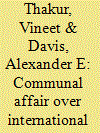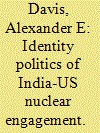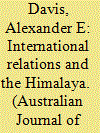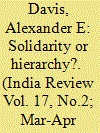|
|
|
Sort Order |
|
|
|
Items / Page
|
|
|
|
|
|
|
| Srl | Item |
| 1 |
ID:
157083


|
|
|
|
|
| Summary/Abstract |
This paper makes an archival journey into the making of institutes of international affairs in late colonial India. By exploring the intertwined lives of two such institutions, it unearths an ideational fight over the study of international affairs in India between the Indian Institute of International Affairs (IIIA), established in 1936, and the Indian Council of World Affairs (ICWA), started in 1943. From the outset, the IIIA was strongly pro-government and saw the ICWA as an institutional rival and a propaganda front for the Indian National Congress (INC). Closer to Independence, the two institutes were increasingly divided along communal and nationalist political lines. The IIIA's leadership became dominated by Muslims and the Muslim League and the ICWA by Brahman Hindus and the INC. As a result, a battle for legitimacy and recognition ensued over participation in international conferences and the ability to publish meaningful research. The ICWA successfully organised the Asian Relations Conference in March 1947, which sealed the fate of the IIIA. It moved to Pakistan in the wake of Partition, then quietly closed down after co-existing briefly with the Pakistan Institute of International Affairs (PIIA).
|
|
|
|
|
|
|
|
|
|
|
|
|
|
|
|
| 2 |
ID:
130876


|
|
|
|
|
| Publication |
2014.
|
| Summary/Abstract |
Although its precise definition is contested, the concept of the 'Anglosphere' has grown in political discourse in the past decade. Anglospherist authors have defined it as a group of states tied together on the basis of shared tradition, laws, liberty and language. And yet they do not discuss India substantively, placing it firmly on the outside of its hierarchy. Others have argued the concept is based in a racialised, Anglo-Saxon identity. In 2005, Manmohan Singh surprised some domestic observers by emphasising India's positive connections to the 'English-speaking world' while speaking at Oxford University. Shortly after, India announced negotiations on a civil nuclear agreement with the US, leading to similar agreements with Canada, the UK and Australia. This article uses the contemporary India-US nuclear engagement to investigate India's position in relation to the ideational space of the Anglosphere and how this shapes India-Anglosphere relations. It is argued that India's postcolonial scepticism towards this space combined with the inherent anglocentrism in Anglosphere identity discourse limits India-Anglosphere relations while simultaneously animating nuclear engagement.
|
|
|
|
|
|
|
|
|
|
|
|
|
|
|
|
| 3 |
ID:
183363


|
|
|
|
|
| Summary/Abstract |
This article examines international relations (IR)'s approach to the Himalaya. We argue that the possibility of violent conflict over contested international borders is not the region's primary international challenge. Rather, slow violence inflicted by state-building and militarisation, intimately connected to geopolitical tensions, threaten the region's ecologies, cultures and languages. The Himalaya is home to three biodiversity hotspots and a mosaic of ethnic groups, many of whom speak threatened languages. Its ice-deposits feed most of Asia's large rivers. In recent years, India and China have pursued large-scale infrastructure development in the region, enabling greater militarisation and extraction, and a tourist rush. These threats are amplified by climate change, which is occurring in the Himalaya at twice global averages, contributing to landslides, flooding, and droughts. However, the region's complexity is not matched by IR's theorisations, which overwhelmingly focus on the possibility of violent conflict between state actors. We argue that IR's analysis of the region must go beyond a states-and-security, Delhi-Beijing-Islamabad centred approach, to look at the numerous interconnections between its geopolitics, cultures and ecologies. We suggest this can be accomplished through incorporating more interdisciplinary analysis, and through focusing on the interaction between the organisation of political authority and the region's environment.
|
|
|
|
|
|
|
|
|
|
|
|
|
|
|
|
| 4 |
ID:
151436


|
|
|
|
|
| Summary/Abstract |
Recent commentary on India–Australia relations has defined the relationship as ‘natural’ and based on ‘shared values’ and ‘shared history’. The relationship has simultaneously been considered ‘neglected’. The paradoxical juxtaposition of a natural/neglected partnership is yet to be adequately explained. We consider the historical construction of liberalism in both states as a facet of state identity to argue that, far from creating a natural relationship, differing liberal identities have served to keep these two states apart. This is illustrated through case studies of divergent opinions over the Nuclear Non-Proliferation Treaty, Russia's 2014 annexation of Crimea and the rise of China.
|
|
|
|
|
|
|
|
|
|
|
|
|
|
|
|
| 5 |
ID:
159375


|
|
|
|
|
| Summary/Abstract |
The idea of solidarity between India and Africa has long drawn heavily from historical sources, including the anti-colonial legacies of Jawaharlal Nehru and Mahatma Gandhi, and ongoing frustration with a hierarchical world order that subordinates them from international decision-making. In this article, I consider the historical ambivalence embedded within the ways in which India now identifies with and talks about “Africa.” I argue that elements of the Modi government’s political project is changing the meaning of India’s identification with “Africa.” After a brief theoretical discussion and a consideration of the historical context, I look at two recent examples in which India’s relationship with Africa was narrated: the 2015 India–Africa Forum Summit and the recent furor over attacks on African students in India. This has already caused upset between India and specific African states. Although still premised on shared resistance to hierarchy, there are signs that the idea of “India-Africa relations” itself can become a hierarchical discourse.
|
|
|
|
|
|
|
|
|
|
|
|
|
|
|
|
|
|
|
|
|